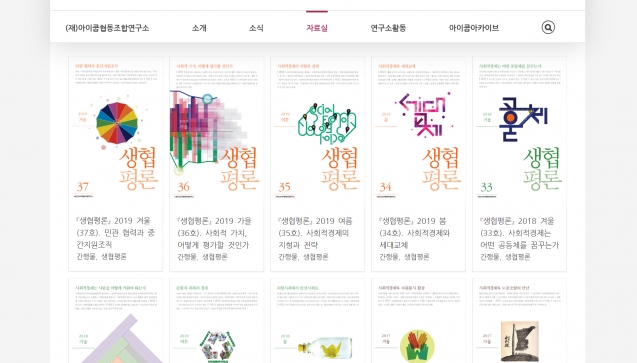Translate To:
iCOOP Co-operative Institute
15.03.2020 00:00:00

There are currently about 10 small and large think tanks in Korea that carry out co-operative research and education. They are the forerunners of raising awareness of co-operative movement through research, recording, education, discussion and seminars, which are the foundation of running co-operatives.
It was in May 2006, the 9th year of iCOOP when iCOOP finally opened iCOOP Co-operative Institute after much consideration and eight preparation meetings, debating the need for research activities since 2004.
Celebrating its 14th Anniversary this year, the Institute is one of the leading co-operative research institutes that has served as a think tank and platform for the Korean co-operative movement along with iCOOP. So far, the Institute has published a total of 324 research reports and data collections with aims to raise awareness of co-operatives and share their achievements and ideas. Moreover, it has fostered new co-operative researchers. In particular, the quarterly Co-operative Journal has conveyed timely topics that cover the entire social economy for the last 10 years, highly regarded by many co-operators as professional journals for the co-operative movement.
In 2014, as a knowledge store for co-operative practitioners and researchers, it started an Archive and registered 4,379 non-electronic and 8,063 electronic records. Additionally, it actively holds regular and extraordinary forums, symposiums, seminars,and other gatherings to build consensus inside and outside of the social economy. All of these activities are even more meaningful in that they are run based on contributions from 290,000 iCOOP individual members. It would not have been possible without the members’ consent and support.
 The institute’s logo contains the dual meaning of ‘institute for both research and action’ since it wants to express its identities as acting researchers as well as researching activists in iCOOP. Undoubtedly, co-operatives are the acting community itself, where members constantly communicate and practice. The role of the research institute is significant as co-operatives grow through ‘Education, Training, and Information’, one of the seven principles of co-operatives.
The institute’s logo contains the dual meaning of ‘institute for both research and action’ since it wants to express its identities as acting researchers as well as researching activists in iCOOP. Undoubtedly, co-operatives are the acting community itself, where members constantly communicate and practice. The role of the research institute is significant as co-operatives grow through ‘Education, Training, and Information’, one of the seven principles of co-operatives.
Aligning with its 2020 theme on co-operative ecosystems in social transformation and aging and decreasing population, the Institute will conduct research on the co-operative business model, governance and legal system. Furthermore, it plans to strengthen research cooperation and networks with various fields by running co-op research groups on labor, taxation and mutual business. In addition to current activities, its future collection of ‘Life Diary’ written in diary form will show members’ household economy and use of co-ops.
